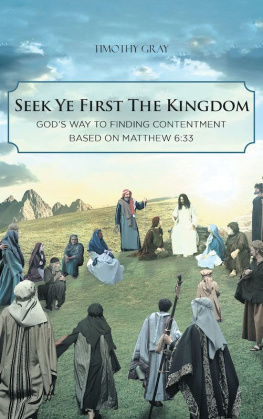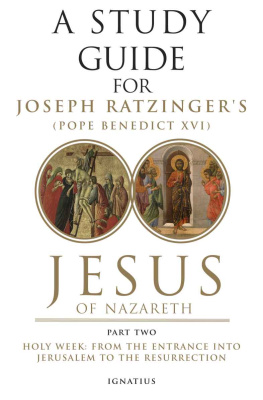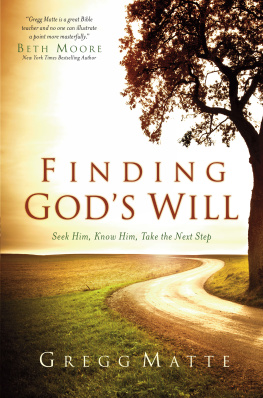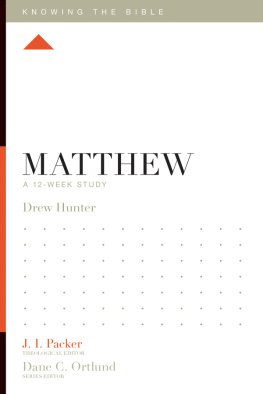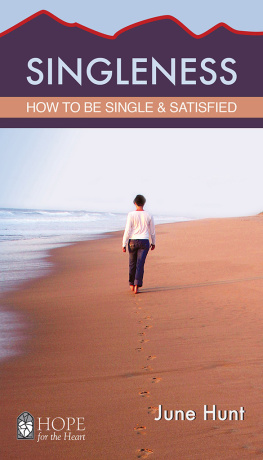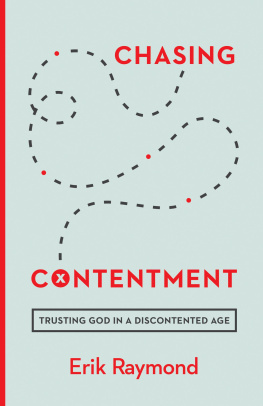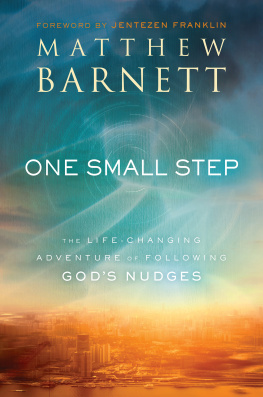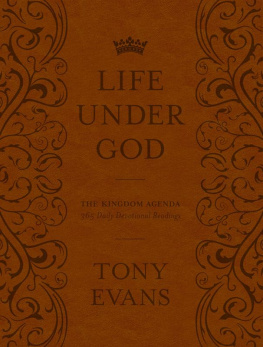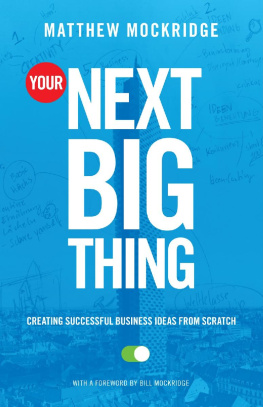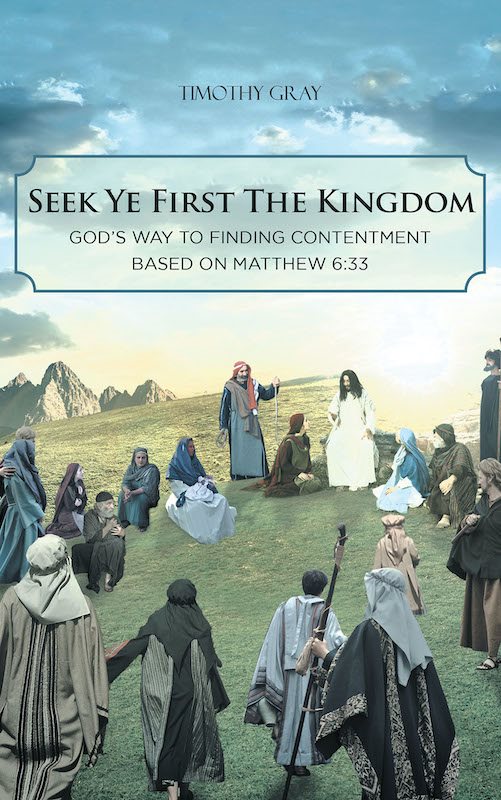Acknowledgments
T he making of this book would not have been possible without the help of several people, to whom I am very grateful. First and most of all, I want to thank our Heavenly Father for sending those people to help me, and for giving me the ability to put into words what He laid on my heart to write. Next, I want to thank my wife Diane, who so unselfishly gave up many bicycle rides in order for me to spend time in my study. I owe a huge thank you to my Navy shipmate, friend, and author Frederic W. Burr, who tediously went above and beyond in proofreading and offering his sage advice regarding the grammatical structure. Without Freds experience and wisdom, my high school English teachers would have been appalled! Another person who was a big help by suggesting changes to the text is my brother-in-law, Kirk Whitaker. Kirk is incredibly gifted with intelligence and computer skills and is a man who loves the Lord. I also am thankful to fellow church member Karen Hatch and her husband Don, for their critique, as well as my friend and former Sunday school teacher Bill Sparks, another person whose insight and honest evaluation of the book is treasured and appreciated. Finally, I want to thank my pastor, Mark Helm and his wife Kathy, who are steadfast in their commitment to furthering the gospel, and who having gone through the valley of sorrow themselves, remain content. Their rewards in heaven will be many.
Chapter 1
The Origins of Sin and the Curse
T he biblical account in the book of Genesis records how God created the heavens, the earth, birds and land animals, and the human race in chapters 1:1 through 3:19. A recurring statement is made: And God saw that it was good. Adam and Eve were placed in a perfectly balanced and beautiful environment where their every need was provided for and they lacked for nothing. They, along with the animals, were given the perfect food, which was plants, as verses 29 and 30 record. There was no sickness or disease for mankind or animals, and death did not exist. (Enmity between animals and animals and humans was also nonexistent). Adam and Eve and the animals were perfectly content to have plants as their food source and lived in peaceful harmony together.
God created woman after man because he knew it would not be good for man to be alone (Genesis 2:18). He also gave Adam a place of service in the garden of Eden, that of cultivating it; and because of the perfect ecological state, there were no weeds for Adam to have to deal with.
Something my wife and I really enjoy doing in the spring is planting flowers and a garden. For those of you who also enjoy gardening, you understand when I say gardening is therapeutic. Something about being outdoors in the fresh air and working the soil has a very calming effect. It is a stress reliever indeed. But when the inevitable occursweeds start popping upthe garden or flower bed isnt so serene. The weeds I hate most are those with thorns. Being pierced by them certainly is not therapeutic!
Well, back in the garden before Adam sinned, there were no weeds. Sin is what changed the ecological balance. We learn in Genesis 3:1718 that as a result of Adams sin, weeds appeared; and beginning then, weeds and thistles became and remain part and parcel of the gardening experiencethe only part of it we would not miss if it went away. But we can be of good cheerwhen Jesus comes again and restores what was lost in the fall of mankind, there will be no more weeds. This is because the curse brought on by sin will be removed, and as part of the restoration, this planet will return to its original state of paradise.
Another observation from Genesis 3:19 is that perspiration is mentioned for the first time in this verse. Without stating it as fact, it certainly is possible that before Adam sinned, the climate was so perfect, with the perfect temperature and such, that Adam and Eve performed the duties God gave them without even working up a sweat. It is in this verse that the word sweat is brought into the equation, when God told Adam that from then on Adam would earn his bread by the sweat of his brow. During the millennium that follows the Second Coming of Christ, what was lost in the fall will be regained. Depending on the validity of the above theory of the absence of sweat before sin entered into the equation, besides having weed free gardens, we will not even work up a sweat as we work in our gardens and flower beds during the millennial period!
So we find that before Adam and Eve sinned, they lacked for nothing, and there was no discontentment at all, even in the animal kingdom. It was Adam and Eves sin of eating the forbidden fruit that brought about the curse, and of course a major by-product of the curse, discontentment. Due to Adams position as the federal head of the human race, representing all of us, all of humankind is affected by the curse. This is because we are all born with the sinful nature Adam acquired after his sin in the garden of Eden.
In other words, because Adam was our representative, we would have committed the same sin if we were in the garden instead of Adam. That is what is meant by we sinned in Adam. Sin, however, did not have its origin in the garden, although that is where it came to fruition. Isaiah 14:1314 records the origin of sin, which is also recorded in Ezekiel 28:1117. This was when Lucifer, the angel whose name means shining morning star, committed the sin God hates more than any other sinthe sin of pride. Proverbs 8:13 and 16:5 are also clear about how God feels about sinful pride. The reason God hates the sin of pride more than any other sin is because pride is the root cause of every other sin. The sin that Adam and Eve committed was also founded in pride. By trusting their own judgment in choosing to eat from the tree instead of obeying Gods instruction to the contrary, they yielded to temptation and committed the sin of pride.
To clarify, though, there is nothing wrong or sinful about the pride a person feels when accomplishing a goal (for instance graduating from high school or college) or the pride a parent feels when their children succeed in reaching a milestone in life. This is a healthy kind of pride we should feel. Nor is anything wrong with being proud of being a member of a uniformed organization such as the military or in a law enforcement agency and wearing the uniform with pride. The pride that is sinful is that which elevates self and does not bring glory to God.
An example of this type of pride can be found in the Old Testament book of Isaiah, chapters 36 through 39. This is the narrative of the boasting pride Hezekiah was guilty of. To recap the story, Hezekiah was the king of Judah during the time of Isaiah the prophet. The Assyrian army under Sennacherib, king of Assyria, had invaded Judah and was conquering the fortified cities of Judah. This invasion occurred because unlike previous Judean king Ahaz, King Hezekiah did not want Judah to be part of an Assyrian coalition. Hezekiah trusted in God for deliverance from the Assyrians, and to submit to Sennacheribs demands would be a betrayal of that trust. Sennacherib sent the Rabshakeh (a high official like one of our ambassadors) along with a great army to give Hezekiah a message. An envoy from Judah consisting of Eliakim, Shebna the scribe, and Joah the son of Asaph went out to meet him. The message they were given and told to take to King Hezekiah was to submit to the Assyrians until the Assyrians took them from their own land of Judah to assimilate them in a different land which was much like their own.
Although the location of that land is not disclosed in the narrative, some Bible scholars believe it to be the land of Media due to the similarities of it with Judea, notably in terms of agriculture. Others believe it to be elsewhere in the African continent.

